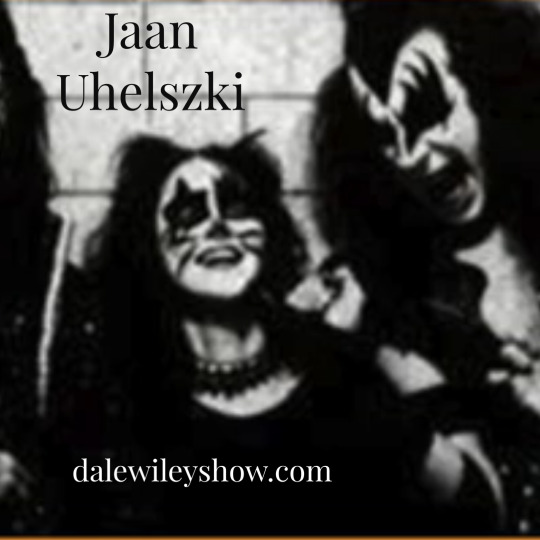#Jaan Uhelszki
Text
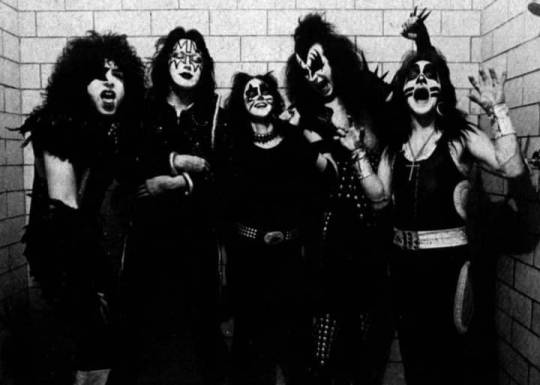

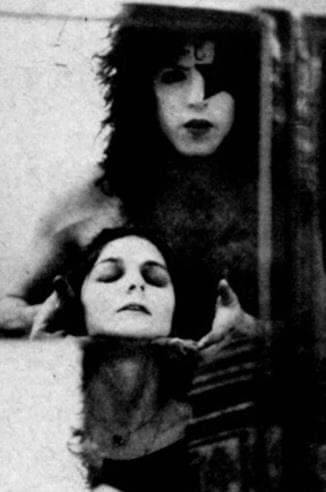

May 17, 1975
Dressed To Kill Tour
War Memorial Arena - Johnstown, Pennsylvania
📸 Unknown
Jaan Uhelszki, a writer for Creem Magazine, travelled with the band from Detroit and appeared on-stage with them for a few minutes during the show. She wore a make-up design based on the composite on the back of the “Hotter than Hell” album cover. The escapade was recounted in the “I Dreamed I Was Onstage with KIϟϟ in my Maidenform Bra” feature in the magazine’s August 1975 issue. She got up on stage wearing a guitar that was unplugged and performed the majority of “Rock And Roll All Nite” with the band as the unofficial “5th Member Of KIϟϟ”.
#kisstory#kiss#1975#hotter than hell#ace frehley#peter criss#paul stanley#gene simmons#kiss band#kiss army#the spaceman#the catman#the starchild#the demon#creem magazine#Jaan Uhelszki
48 notes
·
View notes
Text
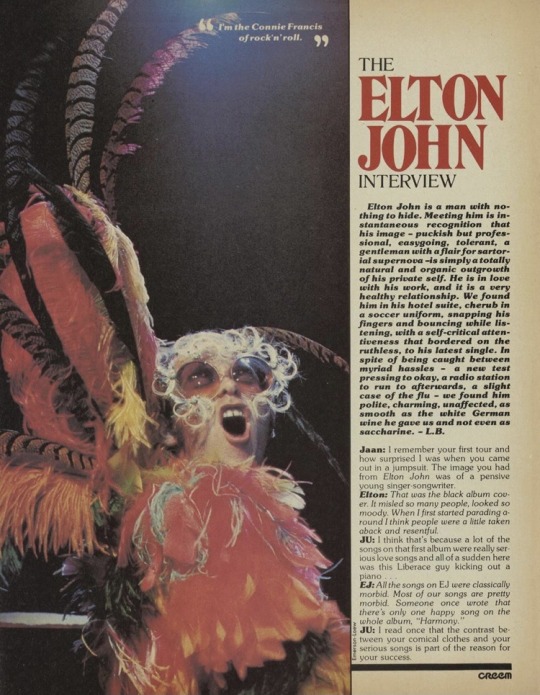
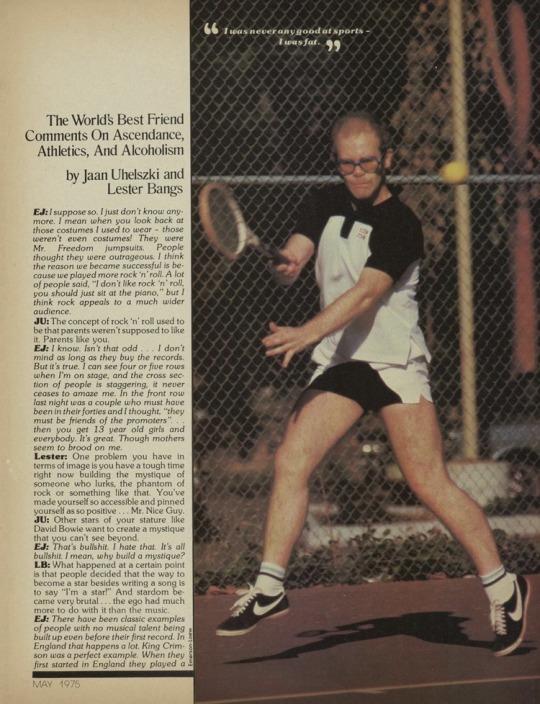
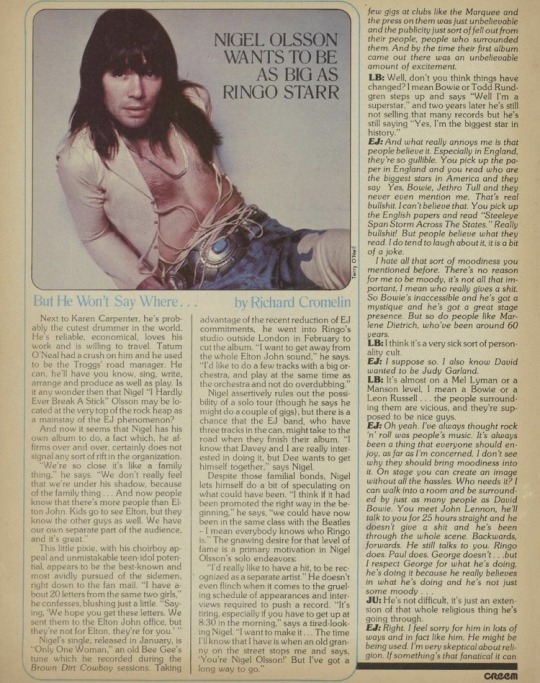
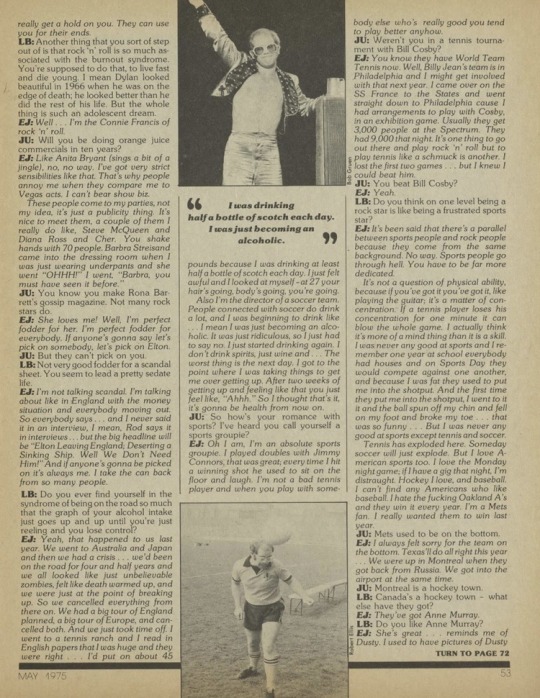


Creem Magazine “The Elton John Interview” by Jaan Uhelszki and Lester Bangs published May 1, 1975
"I'm the Connie Francis of rock 'n' roll."
Elton John is a man with nothing to hide. Meeting him is instantaneous recognition that his image - puckish but professional, easygoing, tolerant, a gentleman with a flair for sartorial supernova -is simply a totally natural and organic outgrowth of his private self. He is in love with his work, and it is a very healthy relationship. We found him in his hotel suite, cherub in a soccer uniform, snapping his fingers and bouncing while listening, with a self-critical attentiveness that bordered on the ruthless, to his latest single. In spite of being caught between myriad hassles - a new test pressing to okay, a radio station to run to afterwards, a slight case of the flu - we found him polite, charming, unaffected, as smooth as the white German wine he gave us and not even as saccharine. - L.B. Full interview transcript under the cut.
JU: I think that's because a lot of the songs on that first album were really serious love songs and all of a sudden here was this Liberace guy kicking out a piano . . .
EJ: All the songs on EJ were classically morbid. Most of our songs are pretty morbid. Someone once wrote that there's only one happy song on the whole album, "Harmony."
JU: I read once that the contrast between your comical clothes and your serious songs is part of the reason for your success.
EJ: I suppose so. I just don't know anymore. I mean when you look back at those costumes I used to wear - those weren't even costumes! They were Mr. Freedom jumpsuits. People thought they were outrageous. I think the reason we became successful is because we played more rock 'n'roll. A lot of people said, "I don't like rock W roll, you should just sit at the piano," but I think rock appeals to a much wider audience.
JU: The concept of rock 'n' roll used to be that parents weren't supposed to like it. Parents like you.
EJ: I know. Isn't that odd ... I don't mind as long as they buy the records. But it's true. I can see four or five rows when I'm on stage, and the cross section of people is staggering, it never ceases to amaze me. In the front row last night was a couple who must have been in their forties and I thought, "they must be friends of the promoters". . . then you get 13 year old girls and everybody. It's great. Though mothers seem to brood on me.
Lester: One problem you have in terms of image is you have a tough time right now building the mystique of someone who lurks, the phantom of rock or something like that. You've made yourself so accessible and pinned yourself as so positive ... Mr. Nice Guy.
JU: Other stars of your stature like David Bowie want to create a mystique that you can't see beyond.
EJ: That's bullshit. I hate that. It's all bullshit. I mean, why build a mystique? LB: What happened at a certain point is that people decided that the way to become a star besides writing a song is to say "I'm a star!" And stardom became very brutal... the ego had much more to do with it than the music.
EJ: There have been classic examples of people with no musical talent being built up even before their first record. In England that happens a lot. King Crimson was a perfect example. When they first started in England they played a few gigs at clubs like the Marquee and the press on them was just unbelievable and the publicity just sort of fell out from their people, people who surrounded them. And by the time their first album came out there was an unbelievable amount of excitement.
LB: Well, don't you think things have changed? I mean Bowie or Todd Rundgren steps up and says "Well I'm a superstar," and two years later he's still not selling.that many records but he's still saying "Yes, I'm the biggest star in history."
EJ: And what really annoys me is that people believe it. Especially in England, they're so gullible. You pick up the paper in England and you read who are the biggest stars in America and they say Yes, Bowie, Jethro Tull and they never even mention me. That's real bullshit. I can't believe that. You pick up the English papers and read "Steeleye Span Storm Across The States. " Really bullshit! But people believe what they I read. I do tend to laugh about it, it is a bit 11 of a joke.
I hate all that sort of moodiness you mentioned before. There's no reason for me to be moody, it's not all that important, I mean who really gives a shit. So Bowie's inaccessible and he's got a mystique and he's got a great stage presence. But so do people like Marlene Dietrich, who've been around 60 years.
LB: I think it's a very sick sort of personality cult.
EJ: I suppose so. I also know David wanted to be Judy Garland.
LB: It's almost on a Mel Lyman or a Manson level, I mean a Bowie or a Leon Russell. . . the people surrounding them are vicious, and they're supposed to be nice guys.
EJ: Oh yeah. I've always thought rock 'n' roll was people's music. It's always been a thing that everyone should enjoy, as far as I'm concerned, I don't see why they should bring moodiness into it. On stage you can create an image without all the hassles. Who needs it? I can walk into a room and be surrounded by just as many people as David Bowie. You meet John Lennon, he'll talk to you for 25 hours straight and he doesn't give a shit and he's been through the whole scene. Backwards, forwards. He still talks to you. Ringo does. Paul does. George doesn't. . .but I respect George for what he's doing, he's doing it because he really believes in what he's doing and he's not just some moody . . .
JU: He's not difficult, it's just an extension of that whole religious thing he's going through.
EJ: Right. I feel sorry for him in lots of ways and in fact like him. He might be being used. I'm very skeptical about religion. If something's that fanatical it can you for their ends.
LB: Another thing that you sort of step out of is that rock 'n' roll is so much associated with the burnout syndrome. You're supposed to do that, to live fast and die young. I mean Dylan looked beautiful in 1966 when he was on the edge of death; he looked better than he did the rest of his life. But the whole thing is such ah adolescent dream.
EJ: Well. . . I'm the Connie Francis of rock 'n' roll.
JU: Will you be doing orange juice commercials in ten years?
EJ: Like Anita Bryant (sings a bit of a jingle), no, no way. I've got very strict sensibilities like that. That's why people annoy me when they compare me to Vegas acts. I can't bear show biz.
These people come to my parties, not my idea, it's just a publicity thing. It's nice to meet them, a couple of them I really do like, Steve McQueen and Diana Ross and Cher. You shake hands with 70people. Barbra Streisand came into the dressing room when I was just wearing underpants and she went "OHHH!" I went, "Barbra, you must have seen it before."
JU: You know you make Rona Barrett's gossip magazine. Not many rock stars do.
EJ: She loves me! Well, I'm perfect fodder for her. I'm perfect fodder for everybody. If anyone's gonna say let's pick on somebody, let's pick on Elton. JU: But they can't pick on you.
LB: Not very good fodder for a scandal sheet. You seem to lead a pretty sedate life.
EJ: I'm not talking scandal. I'm talking about like in England with the money situation and everybody moving out. So everybody says... and I never said it in an interview, I mean, Rod says it in interviews... but the big headline will be "Elton Leaving England; Deserting a Sinking Ship. Well We Don't Need Him!" And if anyone's gonna be picked on it's always me. I take the can back from so many people.
LB: Do you ever find yourself in the syndrome of being on the road so much that the graph of your alcohol intake just goes up and up until you're just reeling and you lose control?
EJ: Yeah, that happened to us last year. We went to Australia and Japan and then we had a crisis . . . we'd been on the road for four and half years and we all looked like just unbelievable zombies, felt like death warmed up, and we were just at the point of breaking up. So we cancelled everything from there on. We had a big tour of England planned, a big tour of Europe, and cancelled both. And we just took time off. I went to a tennis ranch and I read in English papers that I was huge and they were right ... I'd put on about 45 pounds because I was drinking at least half a bottle of scotch each day. I just felt awful and I looked at myself-at 27 your hair's going, body's going, you're going. Also I'm the director of a soccer team. People connected with soccer do drink a lot, and I was beginning to drink like ... I mean I was just becoming an alcoholic. It was just ridiculous, so I just had to say no. I just started drinking again. I don't drink spirits, just wine and... The worst thing is the next day. I got to the point where I was taking things to get me over getting up. After two weeks of getting up and feeling like that you just feel like, "Ahhh." So I thought that's it, it's gonna be health from now on.
JU: So how's your romance with sports? I've heard you call yourself a sports groupie?
EJ: Oh I am, I'm an absolute sports groupie. I played doubles with Jimmy Connors, that was great; every time I hit a winning shot he used to sit on the floor and laugh. I'm not a bad tennis player and when you play with someto play better anyhow.
JU: Weren't you in a tennis tournament with Bill Cosby?
EJ: You know they have World Team Tennis now. Well, Billy Jean's team is in Philadelphia and I might get involved with that next year. I came over on the SS France to the States and went straight down to Philadelphia cause I had arrangements to play with Cosby, in an exhibition game. Usually they get 3,000 people at the Spectrum. They had 9,000 that night. It's one thing to go out there and play rock 'n' roll but to play tennis like a schmuck is another. I lost the first two games . . . but I knew I could beat him.
JU: You beat Bill Cosby?
EJ: Yeah.
LB: Do you think on one level being a rock star is like being a frustrated sports star?
EJ:It's been said that there's a parallel between sports people and rock people because they come from the same background. No way. Sports people go through hell. You have to be far more dedicated.
It's not a question of physical ability, because if you've got it you've got it, like playing the guitar; it's a matter of concentration. If a tennis player loses his concentration for one minute it can blow the whole game. I actually think it's more of a mind thing than it is a skill.
I was never any good at sports and I remember one year at school everybody had houses and on Sports Day they would compete against one another, and because I was fat they used to put me into the shotput. And the first time they put me into the shotput, I went to it it and the ball spun off my chin and fell on my foot and broke my toe . . . that was so funny . . . But I was never any good at sports except tennis and soccer.
Tennis has exploded here. Someday soccer will just explode. But I love American sports too. I love the Monday night game; if I have a gig that night, I'm distraught. Hockey I love, and baseball.
I can't find any Americans who like baseball. I hate the fucking Oakland A's and they win it every year. I'm a Mets fan. I really wanted them to win last year.
JU: Mets used to be on the bottom. EJ: I always felt sorry for the team on the bottom. Texas'll do all right this year ... We were up in Montreal when they got back from Russia. We got into the airport at the same time.
JU: Montreal is a hockey town.
LB: Canada's a hockey town - what else have they got?
EJ: They've got Anne Murray.
LB: Do you like Anne Murray? s EJ: She's great . . . reminds me of « Dusty. I used to have pictures of Dusty stuck on my wall... about 400 of them. She was my idol. Dusty had a desperate desire to be needed.
LB: We hear that you're the Santa Claus of rock. Like Elvis. Like giving John Reid cars.
EJ: Well, its' just that I like giving away presents. My whole philosophy is ... / could be dead tomorrow or something gruesome. I've met so many people who are so miserable with their success. They never have any fun, they stay in their houses. I've got enough money. Really I don't think I'll ever be able to spend all my money. I very rarely buy things. I buy paintings. I have a great art deco collection. I buy a lot of clothes. LB: Do you think there's an element of compulsiveness in the spending and the way you push yourself to be prolific?
EJ: I've got tremendous drive. What you said before, Lester, about spending money now because you can make more tomorrow - that's true to a certain extent. I believe that I'll be around for quite some time. But I'm quite willing to admit that if something happened I could be the world's biggest bomb. I quite like that, that uncertainty. If our record comes in number one in England, great; when our Hits album went straight to number one, beat Bowie's album, I was absolutely delighted. We don't sit down and write something to go to number one but I'm always on the phone saying how's it going . . . especially with Rocket, the label, it's just murder. I worry more about that than I do about me at the moment.
LB: Don't you think there's an element of the ephemeral intrinsic to rock, very few rock stars sustain over the years, they become hacks like Elvis or Jerry Lee or Chuck Berry.
EJ: I don't want to be like them at all, appearing at the big hotel in town in 15 years doing "Crocodile Rock" for 40 old ladies. I know the time will come when I have to say "enough is enough. " LB: You think you'll be able to pack it in?
EJ: Yeah, there's lots of other things I'm very interested in. I'm very interested in the supper club at this time.
JU: What about film?
EJ: "Pinball Wizard," you're gonna die when you see Tommy, Ken Russell made me pull more faces in that bloody movie than I'd done in my whole life. Pulling the worst faces of all time. I get beaten in the movie.
LB: About the ephemerality, don't you think there's a point at which they know they've peaked? I think Lennon's at that point now, but people can't throw in the towel. They can't admit they're not as good as they were, that they've passed their prime and it's a very pathetic syndrome.
EJ: I suppose so. I don't agree with you about Lennon. He's got himself out of those two or three years of chaos. He was surrounded by chaos, John. And / he's got himself out of that and is on the verge of doing some really good things.
But I know what you mean ... I love reading a review that says "Well, Elton John is finished." I must say there was a review in CREEM of Caribou, and it was the worst review (by Billy Altman, November, 1974 - Ed.) It was great. It made me laugh. I don't mind reviews like that because it was very comical. When the guy said that I pinched "Honky Cat" from Lee Michaels that really finished me off.
One magazine printed a letter to the editor from a Kim Sand in Montego Bay, Jamaica, I'm sure John Lennon wrote it, that says "I'm tired of seeing this tired old closet queen and he doesn't even move around on stage anymore. Elton John belongs in one." It was worse than that. But I love those. LB: After we had Wayne Robins review Yellow Brick Road and he said "he doesn't have sufficient heterosexual good looks blah blah blah," we got this deluge of letters, "the girls at Beaver College think he's sexy and peachy keen." They're absolutely serious.
JU: How do you feel about being a sex symbol?
EJ: I can't understand it. I've always said that rock stars are supposed to be skinny and wasted. I think (with me) with a female it's very much a mother image, "Oh, hey, can I cuddle you. " It's a very subtle thing. In England it isn't. I can't walk around the streets there for fear that I'll get clothes ripped off. They're not subtle at all in England, they just go crazy.
LB: You had a turnover of fans at a certain point in your career which I would place at the release of Madman Across the Water. That's the point where I think a lot of the old Elton John fans decided you were jiving, weren't a serious artist, that you were finished. That's the point I began to like you. You took on a whole new audience at the very point where your initial audience split.
EJ: Like when I say at a show, "This one's from Tumbleweed Connection," there's hardly a ripple. I know exactly what you mean and I think you're quite right. Adding a guitarist made a difference; we've been a band ever since. LB: Did you consciously burn your bridges behind you?
EJ: I'd made my records with session musicians. We had a band but weren't making records together; it was ludicrous. They were getting uptight and I could see their point, and after Madman Across the Water we began to use other musicians more. I thought, "I've gotta start using the people I play with all the time. I've gotta start writing some different types of songs. " That album was Elton John stuck on a bridge. Luckily we went across.
Someone once said to me that I make the funniest records. He said it as a compliment. I mean, "Grimsby?" Grimsby is a pretty atrocious town. Singing a song about it that just makes it sound wonderful.
LB: Do you intend to make your records funny?
EJ: Yeah ... all these people spend all this time creating masterpieces, hours and hours really into things that are just five .chords. I could never believe that they thought they were creating, that they took themselves so seriously . . . I'm serious about some of my songs. "Don't Let The Sun Go Down On Me", is a serious pop song, but "Grimsby" -how can you be serious about Grimsby? That's the whole point of rock and roll.
LB: One last question. Perhaps you can clarify something I've been wondering about for a long time. Why is it, do you think, that there are all these acts like Slade, and Gary Glitter, the Sweet, probably Suzi Quatro, certainly Alvin Stardust - all those teeny tigers who are such a rage in Britain, and they all bomb in the States?
EJ: You have a more sophisticated audience over here. We have a better educational system, but your kids are much more advanced by and large. An English 14 year old boy who buys a Gary Glitter record is simply younger and more naive than a comparable American 14 year old who spends his money on, say, the Allman Brothers. You must remember that you have so many more media outlets over here, more radio stations and television channels and all the rest of it, so the poor dears are bombarded constantly; consequently they become a bit more callous, or at least less gullible. They grow up so fast I sometimes suspect they're older than I am.
LB: They’re certainly more jaded than you seem to be.
EJ: Faugh. Pity, isn't it?
#elton john#1975#interview#Jaan Uhelszki#lester bangs#!!!#ANITA BRYANT DISSING!!!#sports groupie#creem magazine#mine#nigel olsson
12 notes
·
View notes
Text
* San Francisco Examiner (April '98)
Article from: San Francisco Examiner
Faith No MoreÕs Patton has a new band
Faith No More's idiosyncratic front man Mike Patton is close to unveiling his own supergroup. Provisionally dubbed Diabolik, it will feature Patton's gritty vocals, the Melvins' Buzz Osbourne on guitar, Trevor Dunn from Mr. Bungle on bass and Dave Lombardo, the former skin-beater from Slayer.
So where does that leave Faith No More? Insiders say Aerosmith asked the veteran band to open for it on upcoming U.S. dates, but the offer was declined -- because most of the members are ready to give up the ghost.
In addition, Patton has confided to friends that after FNM returns on Friday from a string of festivals in Portugal and Spain, his commitment to the band is over.
No matter what Faith No More's future is, Patton is making plans to debut his band in San Francisco in July. After that, look for the hometown group to play showcases in Los Angeles and New York to generate label interest. With this line-up, it shouldn't be too hard.
-- Jaan Uhelszki
#fantomas#diabolik#san francisco examiner#mike patton#buzz osborne#buzz osbourne#trevorr dunn#dave lombardo#april 1998#1998#jaan uhelszki#text#article#wayback machine#geocities
0 notes
Text
Creem Magazine is back in print and online after 33 years
Creem Magazine is back in print and online after 33 years
The iconic, unfiltered and wickedly funny CREEM is back. Having ushered in a new era of raucous, participatory journalism when the magazine originally launched in 1969, its legendary voice is leading the movement once again. CREEM is launching a free digital archive with every single issue from its original 1969-1989 run available online for the first time ever, as well as a new editorial website…
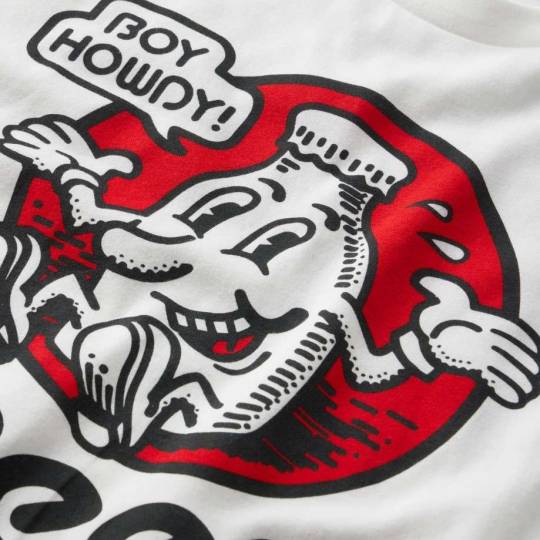
View On WordPress
#Cameron Crowe#Creem#Dave Marsh#Greil Marcus#Jaan Uhelszki#Lester Bangs#Lisa Robinson#magazine#Patti Smith#Robert Christgau#rock mag#Susan Whitall
0 notes
Photo

Started above a Detroit record store in 1969, CREEM magazine would go on to cover the music scene until 1989. Now, 33 years later, it’s back. The first new issue of “America’s Only Rock ‘n’ Roll Magazine” is now in print and online- with a cover by artist Raymond Pettibon.
CREEM magazine gained a loyal following for both its unique writing and format. It also covered the punk, new wave, and heavy metal scenes in a time still dominated primarily by pop and rock music. Lester Bangs, who became more widely known after his portrayal by Philip Seymour Hoffman in Almost Famous, was editor of the magazine for five years. Cameron Crowe, who wrote and directed that film, also contributed articles for CREEM.
The premiere issue of the magazine has something for every music fan, while keeping the feel of the original. Special Interest, Mac DeMarco, Amyl and the Sniffers, Warthog, and KeiyaA are among the current artists covered. There’s an article on an album by The Osmonds and an excerpt from an unreleased book on The Who. Features from the original magazine like “Stars Cars” and their letters section also make a return.
This Wednesday (9/21/22) at The Grammy Museum, there will be a screening of the 2020 documentary CREEM: America’s Only Rock ‘n’ Roll Magazine. The film will be followed by a conversation with JJ Kramer (CREEM Chairman and son of CREEM founder Barry Kramer), Jaan Uhelszki (Editor at the original CREEM and Editor Emeritus today), and Dave Carnie (CREEM Editorial Director), moderated by journalist Scott Sterling.
youtube
CREEM: America's Only Rock 'n' Roll Magazine (Official Trailer)

CREEM also just released a special David Bowie edition of the magazine. It includes articles from past issues as well as an interview with Brett Morgen, director of Moonage Daydream, the new Bowie documentary which opens in theaters today, 9/16/22.
youtube
There are digital and print subscription options for the quarterly magazine and all subscriptions give you access to the digital archives- all 224 of the past issues.
#creem magazine#creem#david bowie#moonage daydream#music magazine#film#documentary#los angeles events#music#raymond pettibon#lester bangs
16 notes
·
View notes
Photo

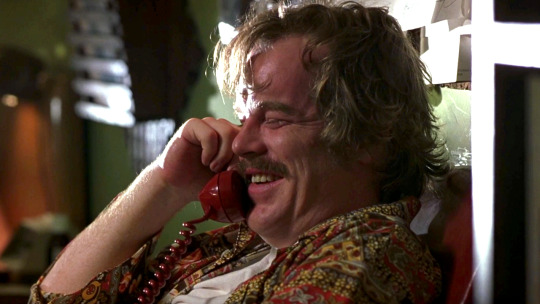
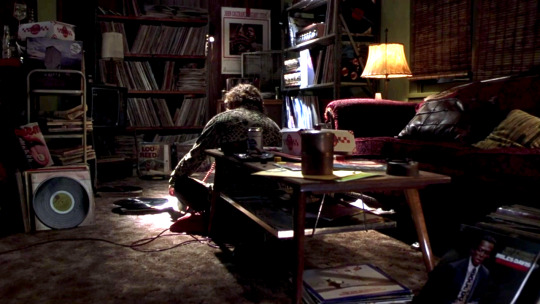



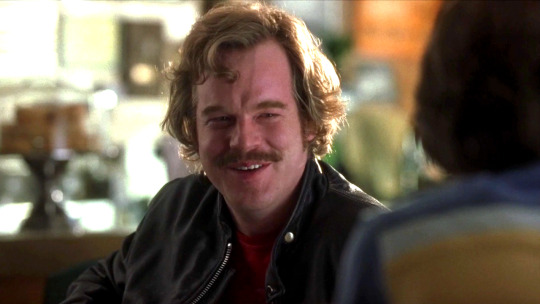
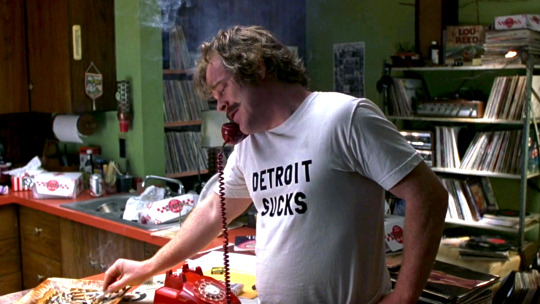
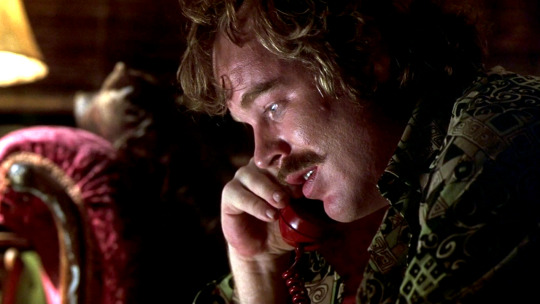
This week’s Monday Philm is Almost Famous (2000) — PSH as Lester Bangs, a role that is nearly a cameo yet one of his most recognizable and celebrated performances of all time. With less than eight minutes of screen time, he is a lot of the heart and backbone of the story — like some kind of fucked-up rock guru version of a Greek chorus, as one of the P.S. I Love Hoffman guys said in the Almost Famous episode I listened to today.
Since my first viewing more than a year ago, I’ve never really written a lot about this movie but I love it. I was a fan of Lester Bangs as a writer and critic before I saw Almost Famous so it’s a very special thing seeing Phil portray him — and doing it so well, so tenderly. As Cameron Crowe said, Phil put so much research and work into developing the Lester character and his loneliness, a side of the real Les that Crowe hadn’t remembered was there until Phil tapped into it. And Lester’s close friend Jaan Uhelszki saying Phil’s greatest gift was his mediumistic talent, the way he channeled Lester on an almost-spooky level.
And doing it all in just a few short days on set — while fiercely, violently ill with the flu! It’s impossible to tell he was so sick, maybe the only traces being the way he carries himself in that one outdoor scene? though maybe I’m projecting, and that kind of lethargy is also very Lester, he almost always looked ill with something, so it’s fitting!
Tonight’s Philm was a bit differently than usual — I just rewatched Almost Famous with my family a few weeks ago, so I decided to watch the director’s commentary track (on the extended bootleg cut of the film). Since finishing Phil’s filmography (a tongue-twister) earlier this year I’ve been meaning to watch more of his work with commentary tracks. It was mostly Crowe (and his mom!) recounting all of the true stories behind the film, experiences on set and in the editing room, etc.
Not much I hadn’t heard about Phil’s scenes before — like how he changed the tone of that final phone call — but a really wonderful new look at the rest of the film as a whole. And some fun comments about Cameron Crowe’s relationship with the real Lester, the time they met in San Diego, Phil’s cigarette drag in one scene (“Our editor feels that is the deepest cigarette inhale ever captured on film, I think he’s right”). Towards the end, one of Crowe’s friends says PSH is “long overdue for an Oscar” so I had to pause and find out when this was recorded! Seems like late 2000/early 2001. I love hearing people saying that and recognizing him in a such a way even then 😌😌
Watching this again reminded me of a few other stories I’ve heard recently from Cameron Crowe and other people who worked with Phil on this set, I’ll try to post those this week, too.
#also the mustache is sooooo good#and everything he wears is top tier#except honestly. knowing how sick he was. seeing that thick t shirt and leather jacket and long pants OUTDOORS in the SAN DIEGO HEAT#makes ME feel nauseated. I'm about to throw up for him#monday philm#almost famous#philip seymour hoffman#psh#*
15 notes
·
View notes
Text

*
These were barbaric times for #women…
Jaan Uhelszki
https://www.linkedin.com/in/jaan-uhelszki-1a5a8b25/
https://www.instagram.com/jaanuhelszki/
https://twitter.com/jaanuhelszki
1 note
·
View note
Photo
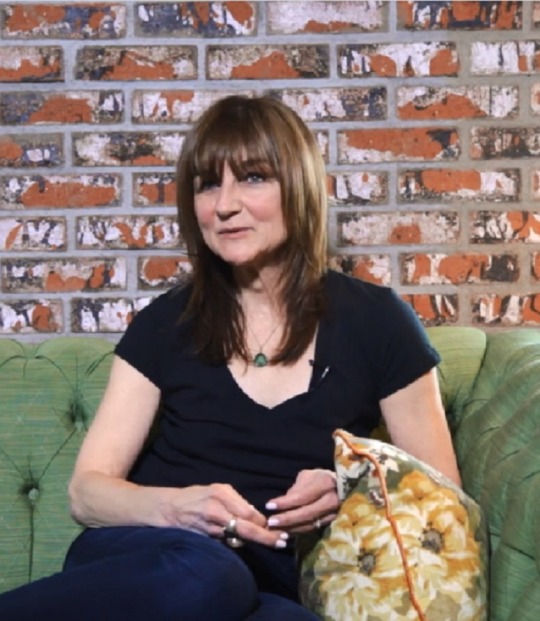
Jaan Uhelszki
Creem Rising to the Top
By Jay S. Jacobs
“America’s Only Rock ‘N’ Roll Magazine.”
That’s a pretty brash statement. A little defiant. Perhaps even a touch naïve. That’s why the catchphrase fit the legendary rock mag Creem – the magazine was proudly all of those things.
Born in Detroit in the late 60s, Creem took a bunch of people who knew nothing about running a magazine, let their passions and their quirkiness loose, and became the bible of rock and roll nerds all around the country for well over a decade. Run by a businessman named Barry Kramer – who had his share of demons but was passionate about the magazine – it became a home for such legendary rock journalists and editors as Lester Bangs, Dave Marsh, Ben Edmonds, Greil Marcus, Robert Christgau, Chuck Eddy and many more.
The magazine became legend. Interviews could be quirky and argumentative. Reviews were brutally frank and often barely touched on the music. Sex, drugs, rock ‘n’ roll, cars, and the fictional “Boy Howdy” beer ruled the day. Rock stars would just pop in because they wanted to party with the Creem staff. For a while, the magazine even became something of a commune, with the entire staff living in a Michigan farmhouse.
However, little over a decade later, Kramer and Bangs were both dead and Creem had somewhat lost its way. It continued on with different owners and different viewpoints, switching to New Wave and Heavy Metal before finally closing its doors in 1989. (It was briefly rebooted with new management as a glossy mag in the early 90s.)
Jaan Uhelszki was at the magazine from the start – one of the women in the boy’s club and writer of some of the magazine’s most iconic stories. She even got the members of her favorite band – KISS – to allow her to put on makeup and go up on stage with them and write about the experience.
In recent years, JJ Kramer – who was only four when his father Barry died – fulfilled his lifelong ambition of regaining the rights to his father’s magazine. He got together with documentary filmmaker Scott Crawford and Uhelszki to make a movie celebrating the crazy life of Creem – the kind of story which probably could not happen in the current world.
Creem had only had one abiding rule: “We are a rock 'n' roll magazine, with all that that implies. Our culture is a rock 'n' roll culture. We are rock 'n' roll people.”
About a week before Creem: America’s Only Rock ‘N’ Roll Magazine was about to be released on Video on Demand, we caught up with Uhelszki to look back at Creem’s crazy glory days.
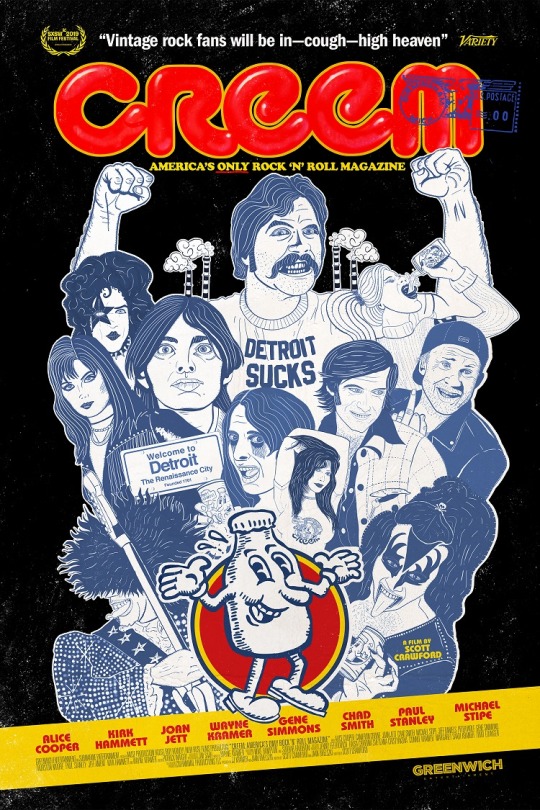
I really enjoyed the film. I particularly looking forward to it the movie because I wrote some stories for Creem towards the end, after you were gone, I believe…
Oh no, I was still there. It was a different entity.
In the 90s when it was rebooted as a glossy for a short time?
Yeah, me too.
Great. So, you were still there. That's cool.
Except that wasn't really Creem. It's like they changed the licensing. I did a cover story called “Look Back in Anger” about the Creem years. I loved Chris Nadler. He was such a great editor. That's a great guy to work with. That wasn't Creem. It was just funny that it still has legs back then. It was such a hard thing to let go of…
I know. I was like too young to be there in the glory days like you. At least I got in at some point in the Creem history.
I know. Well, if we do it again then you know what? Look us up…
Definitely. What was it like to look back at the early days of Creem after all this time?
I wrote half the movie – Scott [Crawford] and I – and produced it. I've been thinking about it for years. Most everything that I am this incarnation – because I’m still a music journalist – [it] all started there. That curious way of writing, putting yourself in the story. What struck me the most was that even though we didn't know what we were doing, and we weren't so much breaking rules as making new rules. The writing was really good.
It certainly was…
I was unprepared for that, because sometimes you look at things with revisionist eyes. You go back to your elementary school and you go, “Oh my god, that's so much smaller than it seemed.” Objects in the rearview mirror were actually bigger than I remembered. I think now I'm much more of a sophisticated reader and writer. Some of the things I read by Greil Marcus, or Dave Marsh, or Ben Edmonds, or even things that I wrote that I thought I hated the time, just really sang,
And of course, Lester Bangs…
Lester was so much more than the buffoon cartoon character he's often portrayed as. There's some of his pieces that had such shrewd analysis. So again, as an adult, I was wowed. When you're in the middle of [working on a magazine] – or you run your own website – sometimes you don't have time to just stop and go, “Wow, we really did this.”
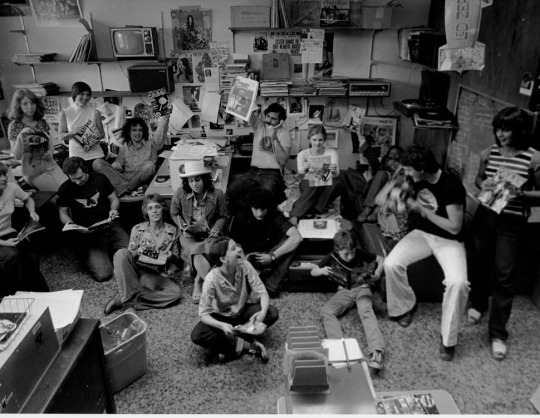
One of the most interesting things in the movie was at the beginning, pretty much nobody really had any kind of background in this stuff. You guys were just getting into it and flying by the seat of your pants. Do you think that that added to the spontaneity and the free spirit of the magazine?
I've got a friend of mine who used to be a Guitar World editor, Brad Tolinski. He says about Detroit, “Detroit isn’t New York and it's not LA. We try to mimic what they do, always, culturally. We get it wrong, but in the getting it wrong there's a genius and originality and imagination. Doing things, a little askew.” I think that Creem has a benefit of that. Or maybe we were victimized by that. But we absolutely had no clue.
That can be a good thing.
You know what we were? We were crazy fans. I would stand at the A&P [an old grocery chain] waiting for the shipment of 16 magazines to come. Even with a teen magazine, I just always so entranced in the lives of rock stars – the Beatles, or even teen idols. Lester read jazz magazines. We were just crazy consumers. Thing that KISS used to say, “KISS isn’t much different than their fans.” We weren't any different from our readers. We were the same.
That was one thing that I loved about Creem. They’d go for some really avant garde artists, but they'd also love the big, commercial artists. In the documentary, they just did a quick shot of this one cover that I had forgotten that was funny, but it's actually kind of cool, too. It was like, “John Denver is God. Bruce Springsteen is Not God.”
Oh yeah. (laughs)
They were open to just about anything. They had some very, cutting edge things but they also had some more middle of the road things too. Did you think that added to the whole feeling of the magazine?
What it was is everybody had a favorite. We all didn't like the same music. You really had to just defend it or write something. It wasn't like “we can't possibly write about that.” I remember Ben Edmonds loved Alice Cooper and Todd Rundgren. I loved KISS. Dave Marsh liked African American artists.
That diversity showed in the magazine.
We didn’t have to sell it. All we had to do is write it, really. There was a lot of freedom of expression. In the very beginning, we could do whatever we wanted, because we weren't really making a lot of money. (laughs) We were just taking a lot of chances. It was great. I've never had that kind of freedom. Never again in my life. I always look at that as the standard. What you're trying to do is get to a situation where you can actually have your voice heard and really, unabashedly love somebody, or unabashedly hate somebody.
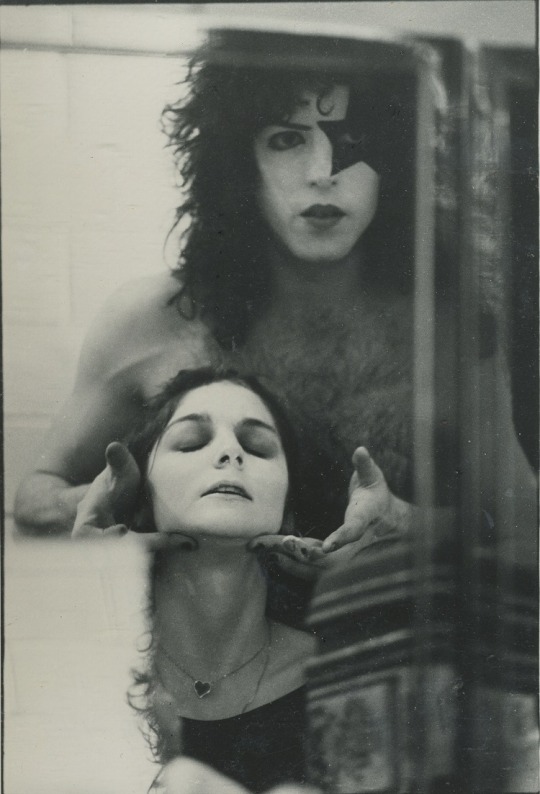
You mentioned your love for KISS. One of your most famous articles was when you got to go on stage with KISS and write about it. What was that experience like? And how did that inform your writing about musicians afterwards?
I was so shocked that I could pull it off, that they actually said yes to this harebrained idea. You go on the road with bands and you see them. You think you're seeing them in the act of being themselves but there's nothing like sitting in front of a makeup mirror for an hour and 45 minutes with four guys. It's like you’re at a gossip-fest. Everybody really did let their hair down. I really saw human moments. I felt like one of them. They let me in the way that no other band did at the time.
That must have been an eye-opener.
Then what happened was when I was on stage with them, I understood how addictive the crowd is. There's a powerful energy that comes from a crowd that hits you like a blast of heat. When you hear about like old hair bands, or people going past what you think is their prime, if you feel that for one song, and understand it, what do you think it's like having your whole career that way and having that stop? It's really hard to give up. I was much more empathetic to why musicians do what they do.
The film also talks about how rock stars with just pop in at the Creem offices with no advance notice or anything. What were some of your favorite experiences?
The Dictators came over and just took it over. Rod Stewart and the Faces came for a party and it was so raucous that I remember Barry Kramer's assistant Sandra Stretke – she's in the film, she's a blonde with a long ponytail – she and Rod Stewart hid under a table, because it just got too nuts. I love Mitch Ryder because he was my childhood hero. He was actually managed by Barry Kramer, so a guy when I was a kid who I followed around outdoor shopping malls because he was like, you know, “Devil with the Blue Dress On.” (laughs) He was in the office all the time. They practiced on the floor above us.
Nice…
KISS came in that famous moment where… I think it's not in this version of the movie, but our director convinced them to take a photo without their makeup on. This was when they were taking great pains to conceal their identity. Somehow – I mean, I know exactly how it was – this photo got out and picked up everywhere. It was stolen from my apartment by my one of my sister’s friends. That was a big hoo-ha. I thought that Paul Stanley wasn't going to be in the film because he's still mad about that, even though it happened, like, oh my god, 1975.
Well he did appear in the film.
You just really didn't know who [would] come. I wasn't there for the Runaways. I'd already left. I was living in Los Angeles, but that was pretty seminal. I remember Joan Jett telling me about it afterwards. She was so proud of it. That's really her brand. She really is that tough chick.
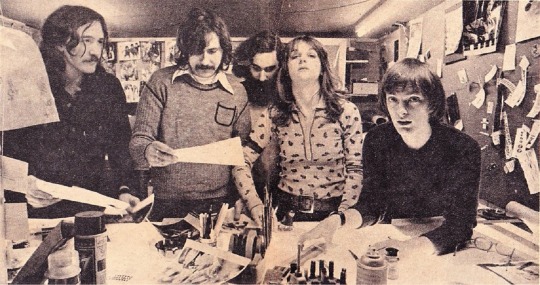
Obviously, Barry and Lester no longer around to talk about the experience, but it seems like the film got most of the other people of note to discuss the magazine. What was it like to see how they turned out? Have you been keeping in touch with them?
You mean, all the people who worked for Creem?
Yeah.
Oh yeah, we're really a tight group. A lot of them have passed on. I was one of the youngest people, and I'm well into… please don't put my age, although they could add it to the numbers. (laughs) A lot of people have gone on to the other world. But the rest of us we really were like in a war together. It was very hard charged.
Yes, that can forge some real bonds.
It was when you think of Keith Richards and Mick Jagger. The tension that comes out of that relationship ends up in really good songwriting. It was that same kind of creative tension and argumentation. Just big personalities all the time. Either you were part of that, or you witnessed it. We all keep in touch. Susan Whitall, I've known since the day she came into the door and we're still really close. Dave DiMartino, Bill Holdship, Lenny Kaye, so many of them. Yeah, we are close.
Were there any people that you would have liked to interview that the film couldn't get?
Most of the people who passed on. There were people that we covered. A lot of people passed away while we were doing it. Ben Edmonds, who was an editor while I was there, he came a little before me. Just people that we've covered. We wanted to get Ian Hunter because he was such a big part of our myth. He used to be a really close friend of Lester Bangs. Sometimes you'd come into the office and he'd be asleep on a sofa next to Lester's desk. But it was just logistics.
Right.
I think we got [mostly] everybody we wanted to. We wanted Patti Smith. But you know, Patti Smith is bigger than Patti Smith was then. It was schedule and how she spends her time these days. I think probably she was the one that got away for me. Me personally.
Several of the writers, particularly the women writers, noted they know that they Creem could be brash, even a little bit mean sometimes. The world has changed so much with political correctness and everything. Do you ever look back on things that you did back then or the Creem did and then wonder how you guys got away with it?
I know I said that movie, “I wrote half of the captions, so kill me.” I rather regret that I said that. I was being a little defensive. I don't think were gratuitous on the sexism or gratuitously mean. What we were was funny. We wouldn't put something in just for the wow factor, the shock factor, of sex. It had to be funny. It's like that Roger Rabbit, quote: “It’s only a joke if It's funny.” It was only used If it was funny. If it wasn't, then it wouldn't go into the magazine.
That makes sense.
Despite what some have said we really weren't a skin magazine, although we got racked that way for a long time in 7-Elevens. I don't feel like anything was really mean spirited. It was ironic. It might have been retaliation. In some cases, if someone got a bad review it was because we so loved them and you're disappointed. It was some kind of inverse rule where I would actually be harsher on somebody I'm a massive fan of when they will release an album which I think it's not up to their talent level.
You know they can do better.
I know Lester was that way. I think that's the genesis of all his Lou Reed problems. He was so mad at Lou Reed because the Velvets [The Velvet Underground] were his Beatles. Once Lou left and went on his own and was releasing albums, like Berlin, I'm not sure which one really peeved Lester. He would just goad them and try to have them defend those art statements, although the one he loved so much was Metal Machine Music. He used to play it in the office over and over and over. And he had the controls of the record player, which was above his desk, so we couldn't get him to take it off. That was torture.
Yes, I know that feeling. I once worked in a record store. And they wound play the same albums repeatedly and you just wanted to go “aughh!”
(laughs) I know, right?
Metal Machine Music while it's interesting, it's not the type of thing I think you want to listen to on a regular basis.
Oh no. Exactly.
Were there any new things that you learned about Creem in the making of the film that you didn't know back then or hadn't heard over the years?
No, I was pretty much there from 1970 and within contact to almost the bitter end, so nothing surprising. Really the only thing that surprised me was I thought we were faking it for so long and I realized we weren't. I didn't have an appreciation for the years after Barry died and Dave DiMartino was the editor and Bill Holdship. I had gone back to school. I took about seven good years off to raise a daughter and go back to college. I didn't really read Creem then. I wasn't going to an Elvis Costello concert. I was listening to mom rock. (laughs)
A whole different lifestyle.
Going back into the archives to pull things, I read a lot of stories that were just as good as the early stuff. I know that it often gets criticized that after Lester and I and Ben Edmonds and Dave Marsh left, it really had lost luster. That’s not really true. I think that they were just as funny. A different kind of sense of humor, but it's just as good and just as funny. Up until the end, up until it was sold and moved to Los Angeles, I thought it was a really excellent magazine. It was a different beast. They should have even changed the name when it went to LA. Maybe even the Carnegie Publishing [era] was probably better. That was a revelation for me because you get a little snobby about your own era.
Well, like I said, I was in the later era. That was not even mentioned in the movie, which was right. I totally get that. Even the New Wave/Metal middle 80s section was just sort of mentioned in two or three sentences and that was about it. Why did you guys decide that you wanted to really hone down on that one era?
That’s considered the golden era, when all the people who broke out of there became bigger. That that was kind of the incubation tank, where we all were just getting started. That's when the sales started skyrocketing. We were the number two magazine, behind Rolling Stone. Given that [the film] was Kickstarter funded, we didn't have a lot of money to tell our story.
Yes, that’s always a concern.
We wanted to concentrate on one narrative arc. The narrative arc which actually appeared was when I interviewed Cameron Crowe and he likened it to a band. I'm not sure that it's 100% accurate because I think we were just as much an ensemble cast as Friends, but it made sense to hang the narrative tag on the fact that was Lester, David and Barry and it was a band. It was a band, putting out a magazine about bands.
That makes sense.
It was an economical and a narrative decision. And we would only deal with the Kramer-owned entity. We wouldn't have dealt with the guy who owned Raygun or the later Carnie publishing, because it wouldn't have fallen under JJ’s auspices and wouldn't really pertain to him. It was a story of finding his father. That was really the subtext of the whole movie. He wouldn't have found his father in the Marvin Jarrett version or the Carnie publishing version. That's why it focused on that one time period. It really ends when Barry dies and Lester dies.
Right, exactly. How important is that JJ has gotten finally gotten the complete rights back to the to the classic catalog of Creem?
I think for him, there was a hole there and now there's not. It’s no accident that he became an intellectual property lawyer. It's almost like when your mom dies of cancer, you become an oncologist. JJ wanted the rights of this magazine back since his mom had to sell it. That was his lifelong mission. I think he’s like 43-44, and he’s done it. That has to feel so good. That's much bigger than what anybody else has ever even done in that documentary. JJ got something so much more valuable. It's like the commercial: It's priceless.
It sure is.
That's what makes me happiest about it. I owe Barry Kramer my career. If I could be a small part of helping his son figure out what his absent father was really like, that makes me happier than any single thing about this whole movie.
Obviously, magazine publishing has taken a lot of hits over the years.
Oh yeah.
Do you think it would be possible for there to be another Creem, not even necessarily a music magazine, just that kind of a working situation in the new millennium?
Remember Spy magazine? And there were some other magazines that actually could tell the truth and be funny and they weren't dependent on the access they had to stars. I think the reason people aren't able to publish such a candid magazine, such an irreverent one, is because they're always afraid of access. Once you take that off the table, you can tell the truth and you really are responsible to your readers.
True.
When Creem started out, we were really conscious that we didn't want teenagers wasting their money on bogus pieces of art. Like the review Lester [did] of Alice Cooper: “a shameful waste of plastic.” We wanted to prevent them from spending their allowance money frivolously. That was part of our mission and I think that should still be a mission. I listen to movie reviews on KCRW every Friday to decide what movies I'm going to rent or stream. I actually want to hear the truth. I think that most people are like me. I think that there is a place for that. You just have to do it. And, again, do you have to worry about the money? Yeah, you do have to worry about the money, but I still think that there's such a need for that. I mean, don't you feel that with your website? Do you feel like you really want to tell the truth?
Totally.
Look, you're doing it then. You're doing it. So, you have to know that as possible. It's paramount.
Absolutely. Okay, one last question. It's off topic, but it's sort of everyone's life right now. How are you dealing with the new state of the world, the whole shelter in place lifestyle?
I’m such a hermit because life as a writer. I don't know about you, but I don't really see anybody when I'm on deadline. So, my life hasn’t changed all that much. I think the good things that happen from it is you’ve got a lot of time by yourself. You think about what's important to you. I don't want to sound all cheesy and emo and Lifetime movie, but it's concentrated my mind. It's not that things don't matter. People matter. I'm just grateful for that, and a little fearful. I'm really careful about it, but the story of my life really hasn't changed that much.
Thank you so much for speaking with me. And best of luck with the movie.
Thanks, Jay. And thanks for carrying on the torch and being part of Creem even if it wasn't the Kramer-owned Creem. At least you were part of that. I thought that was a really good magazine when it was oversized and glossy. I was proud to be a part of that.
Copyright ©2020 PopEntertainment.com. All rights reserved. Posted: August 27, 2020.
Photos courtesy of Greenwich Entertainment. All rights reserved.
3 notes
·
View notes
Photo

“At least in my mind, the ones that I just named build their own little world and you have to begin to understand it to like each of them."
- PETER PRESCOTT (Volcano Suns/Kustomized/Mission Of Burma/MINIBEAST)
BEST REASONS TO WRITE FUCKIN’ RECORD REVIEWS IN...1986
The FRR staff is in frenetic mode as we compile our Best Reasons To Write Fuckin’ Record Reviews In 2017 year end list...our 5th annual splurge! While you wait...why not revisit the Best Reasons of yesteryear? Every single selection was ear picked with Peter Prescott’s criteria in mind: music made within its own little world...
BEST REASONS TO WRITE FUCKIN’ RECORD REVIEWS IN 2016
BEST REASONS TO WRITE FUCKIN’ RECORD REVIEWS IN 2015
BEST REASONS TO WRITE FUCKIN’ RECORD REVIWS IN 2014
BEST REASON TO WRITE FUCKIN’ RECORD REVIEWS IN 2013

Peter Prescott Bands To Watch In 1986 from MATTER No. 15 (June 1986) (page 17) ELIZABETH PHILLIP, Editor
Pic of Creem’s Lester Bangs and Jaan Uhelszki from 1972
#Best Reasons To Write Fuckin' Record Reviews In 2017#Peter Prescott#Volcano Suns#Minibeast#Mission Of Burma#Kustomized#Lester Bangs#Jaan Uhelszki#1972#2017#Creem#Elizabeth Phillip#Matter
17 notes
·
View notes
Photo
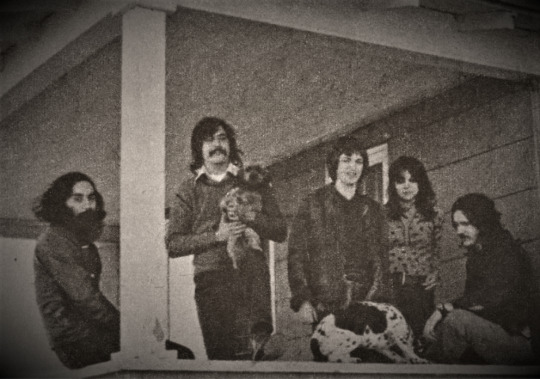
Uncredited Photographer The Writing Staff of “Creem” Magazine (l to r... Ric Siegel, Lester Bangs, Dave Marsh, Jaan Uhelszki and .Charles Auringer) 1973
“O.K., I'm a rock critic. I also write and record music. I write poetry, fiction, straight journalism, unstraight journalism, beatnik drivel, mortifying love letters, death threats to white jazz critics signed ‘The Mau Maus of East Harlem,’ and once a year my own obituary (latest entry: ‘He was promising...’).” Lester Bangs, "An Instant Fan's Inspired Notes: You Gotta Listen" 1980
20 notes
·
View notes
Text

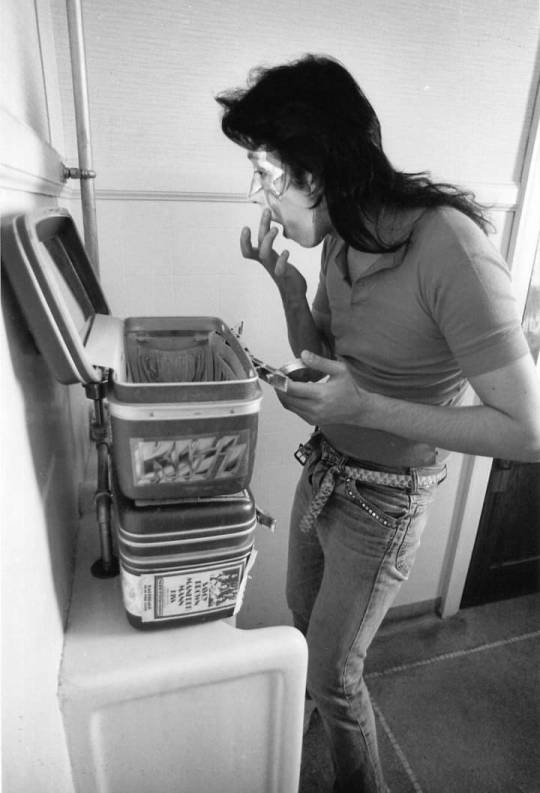

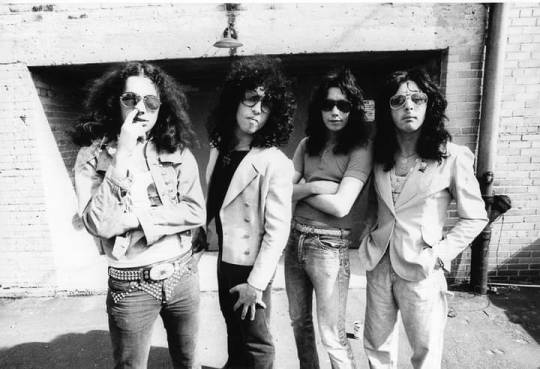
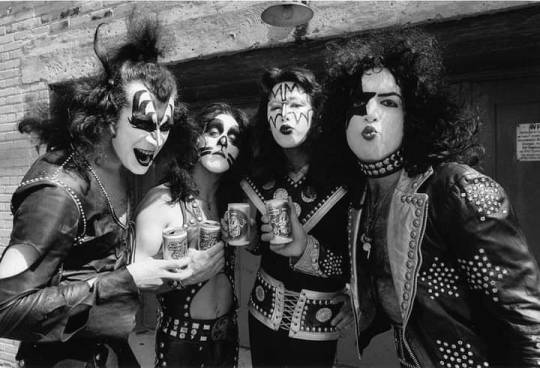
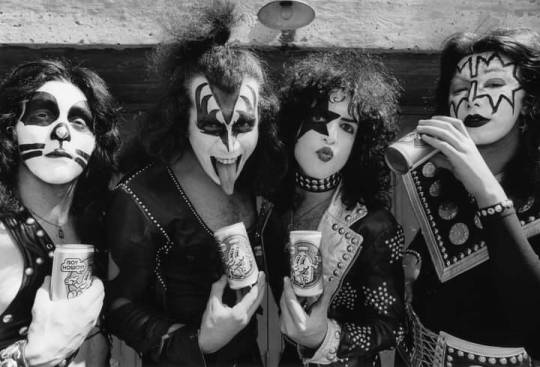




May 13, 1974
Creem Mag Photo Session
Creem Office - Birmingham, Michigan
📸 Charlie Auringer
"I actually inherited the KIϟϟ beat at Creem, because no one else really wanted it. For me, nothing is more compelling than an idea who's time has come. KIϟϟ's had. They had first came into my life when their promotion man at Casablanca Records called and asked if we could do a Creem Profile, the fake ad we used to have in the magazine based on the Dewar's Scotch ad. So, without any hesitation, Larry Harris brought them to our office, a rather casual set of offices in suburban Detroit above a movie theater. They walked in without their trademark make-up, looking like four rather normal rock types. Very politely they asked if they could take over the women's bathroom to suit up. The transformation was incredible. When they had their makeup on they became towering giants and they took up more psychic space than they did without the makeup on. It was pure bedlam with the staff secretaries fighting to sit on Gene Simmon's lap and the dentists across the hall popping in to see what all the commotion was. And there was a lot of commotion, it was strange what havoc a few jars of clown makeup, red lipstick and eyeliner could wreak. Charlie Auringer, Creem's art director, took the shot of them in full regalia and that was it. Or so we thought. They retired to the bathroom again, removed the makeup and were about to pop back into their waiting cars, but Charlie convinced them to pose for one more shot without makeup. I think it was just so early in the game, they agreed. Just one of the so split second things. That was the beginning of our relationship with the band. After that, anything we asked their management for, they always complied. We gave them a lot of coverage when everyone else was treating them like a joke. To me it was a campy, bizarre, death of art, Warholian type of thing. Why would you ruin their superhero kind of appeal by printing that photo of them without makeup? It never really entered our minds to do that. Okay, maybe it entered our minds..." - Jaan Uhelszki/Creem Magazine Journalist
#kisstory#kiss#1974#creem magazine#ace frehley#paul stanley#peter criss#gene simmons#kiss band#kiss army#the spaceman#the starchild#the catman#the demon
34 notes
·
View notes
Note
Hi :-) Have you read Jaan Uhelszki 's article on Led Zeppelin (Creem, July 1977)? If so, do you know where I can find it?
Hey! I assume you mean the Sodom and Gomorrah piece? If so, yes, I’ve read it. It’s a really good article imo, but I don’t think Robert was terribly happy about it getting printed lol. I found it on rocksbackpages.com when I was a member, but I no longer subscribe. I don’t think it’s available anywhere else. Sorry, anon! If you really want to read it, I’d suggest signing up. It’s got lots of good stuff. xoxo
7 notes
·
View notes
Photo

New on the RBP home page
THIS WEEK we mark a half-century of Californian institution the Doobie Brothers with free archive pieces by Sounds' Jerry Gilbert (1972) and – from the more yacht-friendly era of Michael McDonald – Creem's Wayne Robins (1975). There's also a long 1982 interview with Doobies/Little Feat/Van Halen "super-producer" Ted Templeman.
Also free on the RBP home page are three interviews by Jamming! founder-editor Tony Fletcher, who this week publishes an anthology of pieces from that pioneering publication: read Tony here on Scritti Politti, the Special AKA and Sniffin' Glue's Mark P. We also wave sad goodbyes to Labelle's Sarah Dash, Cabaret Voltaire's Richard H. Kirk and Delta 5's Julz Sale.
The week's new audio interview is Martin Aston's 1989 chat with the extraordinary Mary Margaret O'Hara, whose Miss America remains a cult '80s classic. Subscribers can also enjoy the 50+ new articles we've added to the RBP library, which include great pieces about:
The Weavers (1963)
L.A. after Manson (1969)
Adam & the Ants (1981)
Blue Note (1985)
Dinosaur Jr. (1991)
Larry Levan (1993)
Jim Dickinson (2009)
and (from this year) Vivian Stanshall.
Hear Mark, Martin & Jasper talking in the new RBP podcast episode about Buena Vista, Fleetwood Mac and Creem's Jaan Uhelszki.
As he rises to her apology,
Anybody else would surely know...
#doobie brothers#mary margaret o'hara#Jamming! magazine#labelle#Cabaret Voltaire#Delta 5#music journalism
1 note
·
View note
Photo
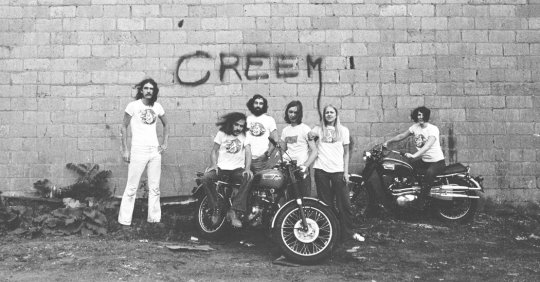
The Wild Story of Creem, Once ‘America’s Only Rock ’n’ Roll Magazine’ On Jaan Uhelszki’s first day at Creem magazine in October 1970, she met a fellow new hire: Lester Bangs, a freelance writer freshly arrived from California to fill the post of record reviews editor.
0 notes
